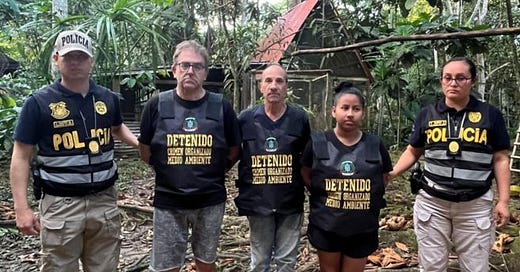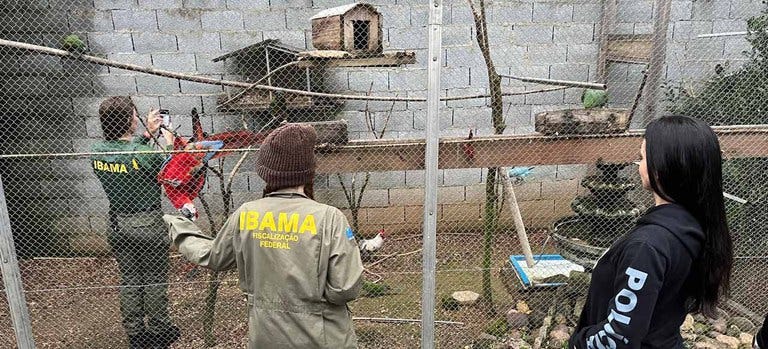The Wild Crime Report for Monday 30 June 2025
Wildlife busts across Latin America and Asia, big sentences for pangolin and rhino traffickers and a breakthrough for ivory detection.
Welcome to the Wild Crime Report for another week.
Apologies for the absence of a report last week,. There was some holiday activity that impeded my ability to deliver you a weekly snapshot of what’s happening around the world.
This week we will go back and cover the last fortnight which, as you’ll be reading below, has been eventful.
So let’s get into some information.
Wildlife trafficking ring arrested in Brazil
Earlier this month, the Brazilian Institute of Environment and Renewable Natural Resources (known as IBAMA) worked with police to conduct a whopping 38 raids, arresting 16 individuals and seizing over 1000 species.
According to the authorities, the investigation commenced in 2024 and identified several trafficking cells operating between the city of São Paulo and several regions around the country. Some of the animals seized in this joint operation, such as monkeys and birds, have been taken into state care with the hope that they can be reintroduced back into the wild.
In addition to wildlife crime offences, some of the accused are being charged for non-wildlife crimes such as fraud and money laundering.
Major wildlife busts in Peru
In what was a double act for Amazonian countries, Peru also conducted a series of busts just last week with the Peruvian National Police, accompanied by international agencies, making arrests and seizures of wildlife in the region of Loreto. Amongst at least 11 suspects arrested, police identified a Spanish national known as ‘El Español’ (second from the left below wearing glasses) as one of the main principals involved in running an international wildlife trafficking syndicate to Asia.
The wide range of species seized within several large complexes illustrates the scale of the operation which is alleged to have been laundering protected species from the nearby Amazon jungle. Further offences of bribery and falsification of information suggest that the group may have had complicit officials involved in their illegal activities.
Three people arrested for smuggling orangutans
Police in Bangkok Thailand last week arrested three Thai nationals for smuggling orangutans. The orangutans were originally saved by authorities earlier this year in January 2025 when they were found in a pick up truck in the possession of a driver. Clearly not resting on that, investigators managed to identify the other members of the network arresting 69 year old Sama Ngo (see below in black outfit), 29 year old Pongsakorn Saengprapai and 43 year old Supawat Weerawongwiwat, 43.
According to police the group had smuggled the orangutans by boat from Indonesia after having sourced them for around USD$2,000 each.
Laotians caught at the Thai border
Further north near the Thai-Lao border and Thai officials arrested two Laotians in possession of 100 kilograms of assorted wildlife carcasses. Police found the men in possession of animals including porcupines, monitors, binturongs and a muntjac. The muntjac in particular is highly protected and listed on Thailand’s wildlife legislation the Wildlife Protection Act.
More seizures coming via planes from Thailand to India
The trend of wildlife seizures in India that originate from Thailand continued this last week when two Indian nationals were stopped landing into Mumbai in possession of reptiles, striped rabbits and a cuscus. They had arrived on a flight from Bangkok which in 2025 has become something akin to a freeway for illegal wildlife.
As is the norm, per Indian law, the wildlife was sent back to the country of origin after the legal process had been concluded.
Leopard parts found in India
In the north eastern city of Guwahati, Indian investigators from the Directorate of Revenue Intelligence (DRI) conducted an operation earlier this month and seized two leopard skins and 2.58 kilograms of bones.
One suspect was apprehended by the police with their accomplice fleeing into the nearby forest. Given the effectiveness of Indian authorities to round up wildlife poaching gangs in the Assam region, the fugitive may not be on the run for long.
Six jailed in Vietnam for pangolin scale trafficking
Vietnam slammed the hammer down this week on six convicted pangolin traffickers sentencing them to various terms of imprisonment for their role in the trafficking of 2.8 tons of pangolin scales in 2023.
The principal, Hồ Văn Mạnh received 7 years imprisonment while Trần Thị Ngọc and Hồ Mai Yên received 3 years prison. A fourth defendant, Phạm Thị Lập received 15 months imprisonment while two more, Cao Xuân Quý, and Nguyễn Thị Long were given suspended sentences.
In a country that continues to be a prolific driver of the illegal pangolin trade, it’s a strong sentence that sends the right message.
Rhino horn trafficker gets 8 years prison
As was the sentence meted out to 41 year old Abraham Makhubela in South Africa when he received a prison sentence of 8 years for attempting to smuggle 10 pieces of rhino horn on a plane bound to Hong Kong.
Makhubela’s co-accused was found not guilty with the case being even more curious for the fact that the seized rhino horn was forensically linked to a previous case and a poaching incident at a private game reserve. However no further details have been provided into the outcome of those investigations by the South African Police Service.
Scientific breakthrough in identification of mammoth ivory
And lastly, some interesting breakthrough in the grey area of elephant ivory being illegally sold as mammoth ivory. Scientists have published a report claiming that an analysis of the isotopes in the tusks may provide a test whereby mammoth and elephant ivory can be distinguished.
The difference is claimed to be in the water that the species consume, or in one case, used to consume. Mammoths drank high altitude water in Siberia whereas elephants consume water in “tropical latitudes” making their hydrogen and oxygen isotopes distinct.
It’s good news, especially if the test is rapid and easily accessible by law enforcement to prevent the sort of ivory laundering opportunity available to traders, as we saw earlier this month in Japan.
Stay wild.












Glad to see that there was jail time for the pangolin case. So often everyone walks away from the confiscations.